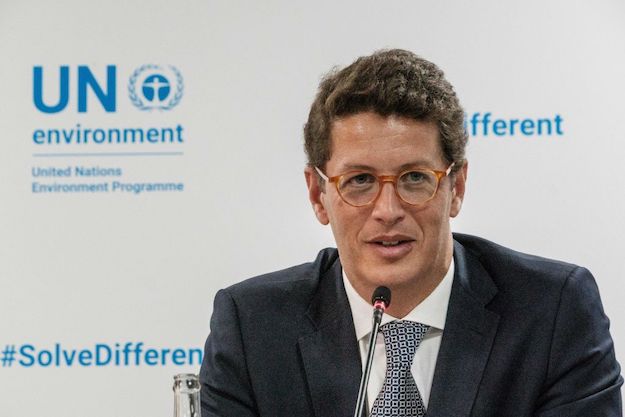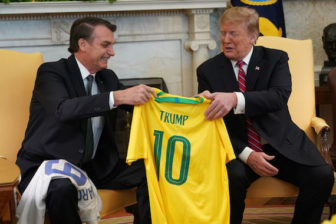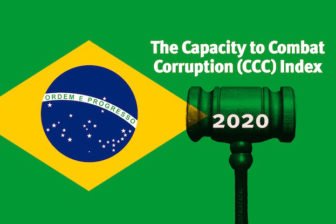SÃO PAULO – When in late May the German Green Party Congressman Uwe Kekeritz questioned a government plan to finance a Brazilian forest protection program, he made sure to mention an episode that had recently rattled Brazilian politics. In a recorded meeting of President Jair Bolsonaro’s cabinet that was later made public, Brazil’s Environment Minister Ricardo Salles suggested that the pandemic was an opportunity to weaken environmental regulations since public opinion was “distracted.” In Berlin, Kekeritz referenced the episode to protest the idea of supporting a project overseen by Salles.
But the congressman went further and also attacked German support for the EU-Mercosur trade deal: “Do you really want to sign a trade agreement with such a criminal regime where human rights and rule of law play no role?”
Debates in Berlin about Brazil reveal a broader dilemma as economic and geopolitical interests clash with surging public concern about the environment. Should Bolsonaro be treated as a temporary irritant to a longstanding partnership or as a more fundamental obstacle to deepening ties?
One of Germany’s main foreign policy priorities is to push through the ratification of the EU-Mercosur agreement during the country’s rotating presidency of the European Council, which ends in December 2020. The accord is seen as important to maintaining Europe’s strategic influence in South America, a region increasingly affected by the power competition between Washington and Beijing.
Germany’s Minister of Economic Cooperation and Development Gerd Müller – a devout Catholic from rural Bavaria known for his public gaffes and frequent disregard for political correctness – responded to Kekeritz’s criticism with a lesson in realpolitik. “Like in Africa, there are many governments that, when looking at democratic and human rights standards alone, we should not be working with. As minister, I almost exclusively work with difficult countries. If we stop our conversations with the Brazilian government … we will neither help the Brazilian people nor the protection of the rainforest.”
Müller’s plan to finance a forest program overseen by Salles has caused outrage not only among environmental NGOs and the Green Party, but also within the German environment ministry, which had earlier put a hold on new funding for Brazil. While many there agree that the trade deal could be in Germany’s interest, the decision to directly support a project tied to Salles is generally seen as sending the wrong signal, leading to friction between the two ministries.
Müller’s outreach to Salles has also led to criticism in Norway, which together with Germany contributes over 90% of financial support to the Amazon Fund. The impression in Oslo was that Müller’s stance complicated efforts to jointly pressure Brazil to do more against deforestation after payments were suspended last year due to disagreements over Bolsonaro’s environmental policy.
It is no coincidence that Salles has come to symbolize this dilemma. Perhaps more than any other Bolsonaro cabinet member, the environment minister has gained international notoriety for systematically dismantling environmental regulatory tools. In this he has been remarkably efficient: According to official data, June 2020 saw the 14th consecutive monthly increase in deforestation, while the number of environmental fines given to illegal loggers is at its lowest in 24 years. Even Brazilian diplomats recognize that as long as Salles remains part of the government, Brazil’s capacity to mitigate international concerns over deforestation – now frequently expressed by environmentalists, international investors and Brazilian companies worried about consumer boycotts – is very limited.
Aware of how toxic Salles has become abroad, Bolsonaro has attempted to reduce his minister’s exposure, first by creating the Amazon Council and making Vice President Hamilton Mourão its leader, then by sending Brazil’s armed forces to protect the Amazon, and most recently by imposing a ban on forest fires. Yet international observers quickly called the bluff: Salles remained in charge of Ibama, Brazil’s environmental watchdog crucial to combating illegal logging and mining.
Bolsonaro has refused to fire Salles despite growing international pressure and even after Brazil’s public federal prosecutor asked for the minister to be removed from his post for seeking to undermine environmental regulations. The simple explanation for the president’s inertia is that facilitating deforestation was one of his campaign promises and breaking it could lose him support with an important part of his electorate — illegal loggers, miners and squatters. This group is well represented in Brazil’s Congress by the so-called Bancada do Boi, or “cattle caucus.”
While German diplomats roll their eyes when asked about Müller and Salles — one privately said Salles seems to have “wrapped Germany’s minister around his finger during their meeting” — they share the concern that environmental considerations may hinder long-term strategic goals. After all, they often repeat that “Bolsonaro will one day be gone, but our partnership with Brazil remains.” Chancellor Angela Merkel argued that “the non-ratification of the (Mercosur trade agreement) would not contribute to reducing illegal logging in Brazil’s rainforest by a single hectare.”
Yet German diplomats, aware of growing resistance to ratification in several European capitals, also recognize that the Bolsonaro government is making it hard to publicly defend the deal. By practically ignoring international pressure and frequently rejecting European environmental concerns as neo-colonialism or nothing more than protectionist excuses, the Brazilian government doesn’t help Merkel convince the French, Irish and Austrians, who lead the opposition to ratification, that signing the trade deal would give Europe greater influence in South America. Indeed, Bolsonaro almost seems to make a concerted effort to avoid ratification by providing limitless ammunition to those in Europe who oppose the deal.
Aware that deforestation data is unlikely to improve much before the end of the year — quite the contrary, Brazil’s reputation is set to receive a beating in Europe’s public debate as the fire season in the Amazon approaches — German diplomats believe that either sacking Salles or promising to restore Ibama to its pre-Bolsonaro size would be tremendously helpful to face down growing resistance from their European peers. That, alas, remains unlikely for now.
If Germany manages to see through the ratification of the EU’s biggest trade deal in its history, it will not be thanks to but despite Bolsonaro and his controversial environment minister.







